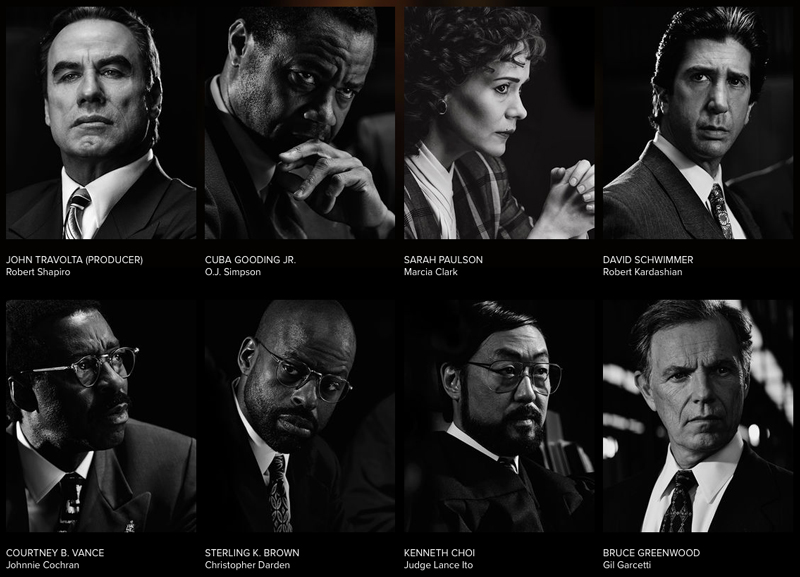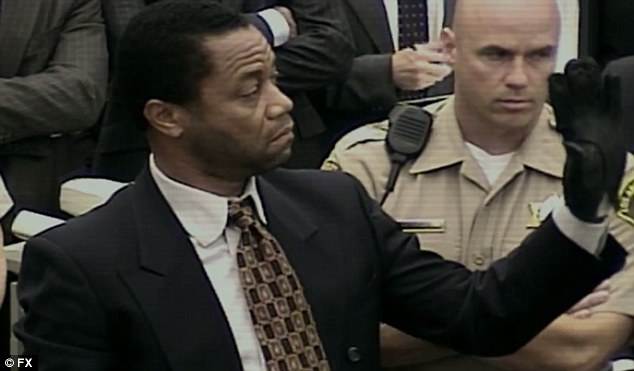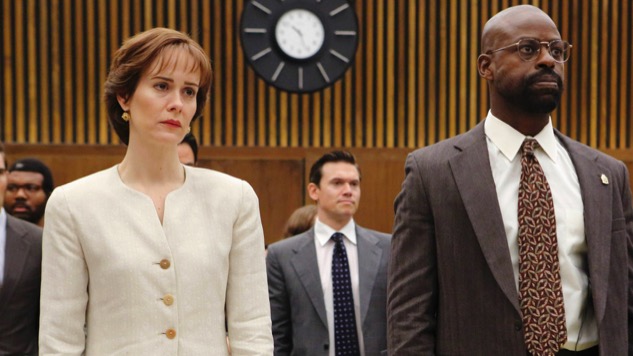We're sharing Emmy FYCs as nomination balloting continues. Here's Lynn Lee...
When promotional clips first started appearing for The People v. O.J. Simpson: American Crime Story, I found myself wondering what on earth FX could be thinking. The whole thing seemed like an obvious misfire: Cuba Gooding, Jr. didn’t look or sound anything like O.J.; John Travolta seemed to be channeling his inner alien under layers of makeup and Botox and a perpetually, awkwardly raised chin; and who was going to be interested in a dramatization of a trial that had saturated the media over 20 years ago and was now being produced by Ryan Murphy, the king of camp? How could it be anything but terrible?

Well, turns out FX knew what it was doing. Not only was The People v. O.J. Simpson not terrible, it just may turn out to be the best drama series of the year. There are many reasons why the show worked as well as it did, and why it deserves Emmy recognition, but three stand out...
First, it made the “trial of the century” relevant again by framing the story in terms of issues that have become more, not less, resonant today: race, gender, and the inevitable churn of the 24-hour news cycle into an insatiable hunt for infotainment. Right from the get-go, the establishing image is the video of the Rodney King beating that eventually led to the 1992 L.A. riots and exposed the deep fault lines between whites and blacks in their experience with the police. It’s the first hint that the trial that follows will end up being a trial not of Simpson but of the LAPD. Far from oversimplifying, the show engages in a really thoughtful exploration of that theme from the varied perspectives of the major black characters: Johnnie Cochran and Christopher Darden, the two black attorneys on opposing sides of the case, each driven by a complicated mixture of desire for justice and desire for personal validation, and Simpson himself, who the show makes painfully clear was the unintended beneficiary of black anger against the police despite his own wholesale adoption of the rich white circles of his L.A. celebrity lifestyle.
At the same time, the writers don’t just focus on the role of race alone in the Simpson trial. They also offer an equally nuanced treatment of gender and the way in which sexism tends to get coopted without comment into societal and cultural norms, from the negative reactions stirred by a woman in the public eye (here, prosecutor Marcia Clark) who’s perceived as overly aggressive or hard-edged or having bad hair or bad fashion sense, to society’s effective tolerance of domestic abuse. Indeed, it’s the latter point that proves Clark’s blind spot: to her, it’s so clear that the murders were the final culmination of a long cycle of abuse and violence, she can’t see that other factors and narratives are taking over the case.

Second, perhaps even more importantly, The People v. O.J. Simpson manages to make events that still linger in the public memory, at least in their broad strokes, newly entertaining and suspenseful. Based in large part on Jeffrey Toobin’s The Run of His Life, the series captures the most momentous and noteworthy beats of the trial, including developments so outlandish you’d be forgiven for thinking they were added for dramatic effect—except they weren’t, proving anew that truth can be stranger than fiction. Most admirable is the economy of the storytelling: in just ten crisply paced episodes it distills everything about the months-long trial that made it such a media feeding frenzy, without losing sight of the underpinning social tensions that made it actually significant.
Third, and perhaps most important of all, is the acting. There’s no doubt that the three MVPs of the cast—Sarah Paulson as Marcia Clark, Sterling K. Brown as Chris Darden, and Courtney B. Vance as Cochran—deserve Emmy nominations of their own. They’re outstanding. But almost as striking is the consistent quality of the entire ensemble, from Nathan Lane’s canny, unexpectedly understated turn as the calculating F. Lee Bailey to the always-reliable Bruce Greenwood’s harried district attorney Gil Garcetti, to David Schwimmer’s surprisingly poignant performance as Rob Kardashian, who goes from being “the Juice”’s most stalwart supporter to racked by serious doubts about his friend’s innocence. And despite being completely physically miscast as Simpson, Cuba Gooding, Jr. does a creditable job conveying the ex-athlete’s odd mixture of self-pity, self-aggrandizement, and shrewd self-promotion. Even Travolta’s kabuki act as defense attorney Robert Shapiro grew on me after awhile: something about its mannered, off-putting artificiality seemed to channel the surrealness of the overall spectacle Shapiro inadvertently helped launch.

I don’t know where American Crime Story will go from here. Word is it’s turning to Hurricane Katrina for its next season, which is potentially promising, and that Ryan Murphy will take on an more active role, which is less so. (Although I wouldn’t object to his relying heavily on the same cast again, as he’s done in his other “American” franchise, especially if he includes Paulson, Brown, and Vance.) But it’s hard to imagine season 2 will top The People v. O.J. Simpson for sheer strength of both conception and execution. Here’s hoping that Emmy recognizes the series in its freshman outing rather than waiting for it to bottle lightning again.